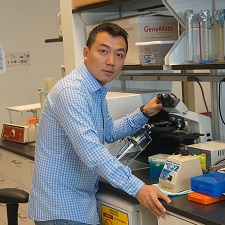Chao Lu, PhD
Chao Lu, PhD

Eukaryotic cells develop sophisticated mechanisms to package and access our genetic information. Recent studies have shown that proteins involved in genome regulation are frequently altered in human cancers. These findings agree with laboratory observations that cancer cells often display abnormal nuclear architecture, and raise the questions of whether, and how, aberrant chromatin organization facilitates tumor development. Collectively, Dr. Lu's previous work has identified the molecular mechanisms by which high-frequency mutations in chromatin regulators reprogram genome-wide chemical modifications of DNA and histones. In addition, his work demonstrated that chromatin mutations are pro-oncogenic through the blockade of cellular differentiation. These studies provide compelling evidence for a causal role of chromatin dysregulation in oncogenesis. He proposes a novel pathway of cancer initiation through accumulation of hyper-proliferative and differentiation-refractory tissue progenitor cells driven by epigenome abnormality. His goal is to apply these mechanistic insights to advance current molecular diagnosis, classification and treatment of human cancers.
